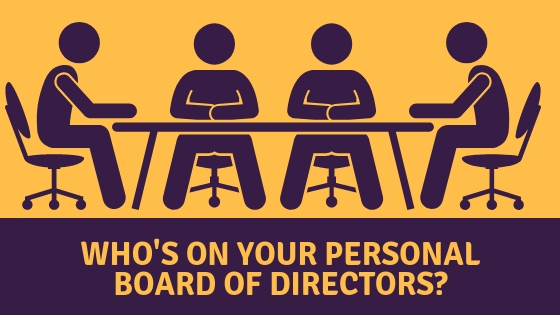September 13, 2018

When I think about it, I’ve always had a personal board of directors. These individuals are trusted colleagues and friends I can always turn to for business and career advice. Each brings a unique skillset to the table. They challenge me to think “outside of the box,” when it comes to business and operations. I value their feedback and have employed many of their suggestions along the way. As professionals, we often struggle with where we need to grow to move up the career ladder. However, a personal board of directors can help uncover our blind spots and provide specific feedback to help us navigate the tumultuous waters.
For example, my colleague Gloria was hired as a senior IT director at a pharmaceutical company. She was considered a top performer who always got results. Gloria’s personal challenge was that she struggled with how to attain her goals. Her dismissive and impatient personality paralyzed her team, and they often walked on eggshells around her. Gloria couldn’t figure out why she was overlooked when it came to being promoted to vice president. To her credit, she assembled a personal board of directors that consisted of supporters and critics who could actively observe and inform her about her interactions. Her board was able to advise her on how she could strengthen her interpersonal skills and better engage her team so they felt more valued.
So how do you build a personal board of directors? Here are some things to consider:
There’s Power in Diversity –While we tend to surround ourselves with people that look and think like us, its best to have people on your personal board that are older, younger and bring different perspectives. You also want to include fans, potential sponsors and critics.
Fans—These individuals help you learn how to change and deliver feedback with kindness and good intent. However, it’s up to you to press them to give you feedback on your areas of opportunity. Ask probing questions such as, “What do you see in my actions that I don’t see?”
Potential Sponsors—These are leaders inside and outside your organization who can advocate for you and speak on your behalf. A few years ago, I was hired as a consultant to provide employee communications. The assignment was only supposed to last three months. However, the assignment lasted three years because of the work and the support of my sponsors who happened to be the senior vice president of HR and the president of the North American operations. Make sure you keep a current list of potential sponsors, as the players often change.
Critics—It may seem counterintuitive to have critics on your personal board, but they can give you actionable feedback on what you can improve.
Also, set up regular appointments with your board members to discuss various issues. Whatever you do, respect their time by showing up prepared. This way you can get the most out of the experience.
Having a diverse group of board of directors will ultimately help you have a greater impact. These individuals are all instrumental in helping you move forward with your career goals.
Dear LaNella,
Your article just so great!! Inspire me to think! Thanks
Thanks Jennifer–Hope you have a few people in mind for your board